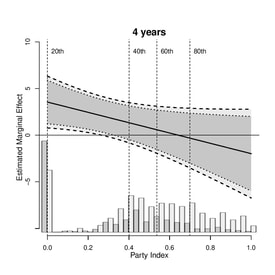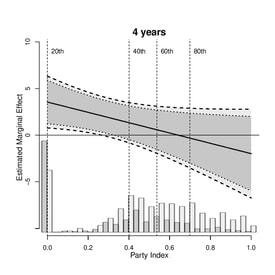To create anchor link: https://www.youtube.com/watch?v=71SlVBgtZG0&t=293s
Working Papers
- Manipulated Date and Motivated Vote: How Changing Election Dates Shapes Turnout
Abstract: Autocracies exploit elections as a tool of political control, but we lack theory and evidence for understanding how manipulated election schedules shape citizens’ political participation. Conventional wisdom suggests that electoral manipulation demobilizes voters. This paper, however, argues that manipulated election dates mobilize voters because this manipulation signals regime weakness. Citizens anticipate the next election will be a tighter contest and therefore become more likely to turn out. I draw evidence from an original online survey experiment in Hong Kong, where the incumbent regime postponed the 2020 legislative election. Experimental evidence that addresses social desirability bias and potential self-censorship demonstrates that election postponement motivates both opposition and government supporters to vote. However, framing election postponement as a signal of government electoral weakness increases the turnout of opposition supporters, while framing the postponement as a response to the COVID-19 pandemic or a regime strategy to deter opposition mobilization increases the turnout of government supporters. Finally, the evidence indicates that election postponement has second order effects that shape voter turnout by boosting citizens’ beliefs that other citizens will be more likely to vote and protest when the election date shifts. The findings suggest that ordinary citizens learn about regime strength from the information revealed by manipulated election schedules, with implications for election turnout and authoritarian stability.
Presented at MPSA 2022, SPSA Summer Meeting 2022, APSA 2022, SPSA 2023, and Virtual Workshop on Authoritarian Regimes (Feb 1, 2023).
Presented at MPSA 2022, SPSA Summer Meeting 2022, APSA 2022, SPSA 2023, and Virtual Workshop on Authoritarian Regimes (Feb 1, 2023).
- Mark Dictators’ Calendars: The Manipulation of Election Schedules in Autocracies
- I Leave in Peace: Autocratic Elections and Negotiated Regime Transitions
title 3
Working Papers
- Publish More as Corruption Perishes: Scientific Research and Anticorruption Campaigns (with Zhongyang He) (abstract and manuscript)
- International Mudslinging in Vain: An Experiment on COVID-Related Propaganda and Overseas Nationals’ Support for Autocratic Government (with Rosemary Pang) (abstract and manuscript)
mark dictaors
mark dictaors
mark dictaors
mark dictaors
title 1

